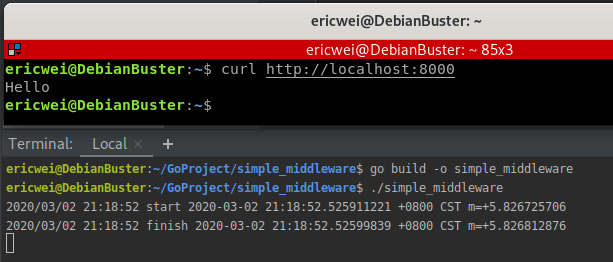HTTP Server Basics
Use net/http package and useful third-party packages by building simple servers.
Building a Simple Server
package main
import (
"fmt"
"net/http"
)
func hello(w http.ResponseWriter, r *http.Request) {
fmt.Fprintf(w, "Hello %s
", r.URL.Query().Get("name"))
}
func main() {
http.HandleFunc("/hello", hello)
http.ListenAndServe(":8000",nil)
}
Run the above program and test it.
curl -i http://localhost:8000/hello?name=eric

You can also use http.ListenAndServeTLS(), which will start a server using HTTPS and TLS.
Build a Simple Router
package main
import (
"fmt"
"net/http"
)
type router struct {
}
func (r *router) ServeHTTP(w http.ResponseWriter, req *http.Request) {
switch req.URL.Path {
case "/a":
fmt.Fprintf(w, "Executing /a
")
case "/b":
fmt.Fprintf(w, "Executing /b
")
case "/c":
fmt.Fprintf(w, "Executing /c
")
default:
http.Error(w, "404 Not Found", 404)
}
}
func main() {
var r router
http.ListenAndServe(":8000", &r)
}
Test the above program by the following commands.
curl http://localhost:8000/a curl http://localhost:8000/d

Building simple Middleware
A simple middleware, which is a sort of wrapper that will execute on all incoming requests regardless of the destination function.
package main
import (
"fmt"
"log"
"net/http"
"time"
)
type logger struct {
Inner http.Handler
}
func (l *logger) ServeHTTP(w http.ResponseWriter, r *http.Request) {
log.Printf("start %s
", time.Now().String())
l.Inner.ServeHTTP(w,r)
log.Printf("finish %s",time.Now().String())
}
func hello(w http.ResponseWriter, r *http.Request) {
fmt.Fprint(w, "Hello
")
}
func main() {
f := http.HandlerFunc(hello)
l := logger{Inner: f}
http.ListenAndServe(":8000", &l)
}
Run the program and issue a request.
curl http://localhost:8000
